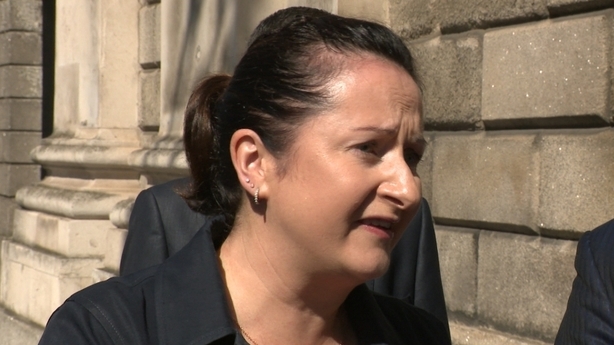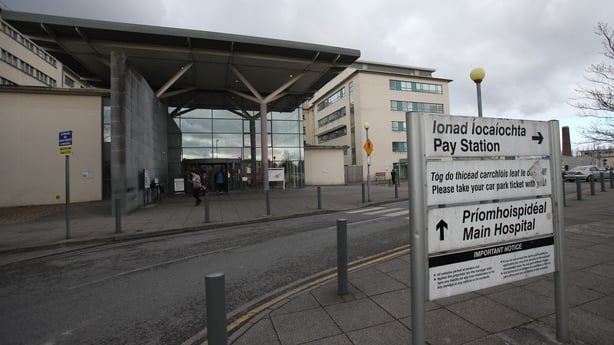University Hospital Galway has apologised to the family of a man who died after surgery for treatable cancer was carried out by a surgeon who was under supervision after concerns had been raised about some of his work.
The hospital acknowledged that the death of Shane Banks, from Strandhill in Sligo, could have been avoided.
The 43-year-old had surgery for lung cancer on 21 June 2019 during which major complications arose. He died three days later.
Senior Counsel Edward Walsh told the High Court that it was a "particularly distressing case" involving the untimely death of a 43-year-old man due to a "catalogue of medical errors".
He said the surgeon involved, Professor Mark Da Costa, had been the subject of a review carried out by the hospital in relation to his ability to undertake complex surgery.
Concerns had been raised in October 2017 about his surgical skills and he had been appointed a mentor but without a proper structure.
A further review the following year resulted in a more formal mentorship programme being put in place for six months, which was subsequently extended by two months, during which time Mr Banks came under his care.
The court was told Prof Da Costa had been warned not to undertake any complicated surgery and was being supervised for his cardiac work. Mr Walsh said this supervision should have included his other surgeries.
Mr Walsh said the surgery was carried out on a Friday with only junior doctors assisting.
It took twice as long as it should have and major complications arose causing an anaesthetist to independently call for assistance, Mr Walsh said.
Prof Da Costa went on annual leave the next day and there was no proper cover provided.
Mr Banks' family was not informed about his deteriorating condition and he died three days later.
We need your consent to load this rte-player contentWe use rte-player to manage extra content that can set cookies on your device and collect data about your activity. Please review their details and accept them to load the content.Manage Preferences
The inquest into his death last year was the longest running in the history of the State and found the cause of death was by medical misadventure.
Mr Banks, a third level college lecturer, is survived by his wife and three young children.

In a letter to his family, University Hospital Galway General Manager Chris Kane acknowledged the enormity of the personal loss to the family.
It went on to say: "I sincerely and unreservedly apologise for the failure to consider the introduction of proper supports for the thoracic surgery in Shane's case and the deficits in the manner in which his surgery was carried out.
"If these had been in place and addressed, Shane's sad death three days later would likely have been avoided. I acknowledge and regret the great upset, distress and loss suffered as a result."
The apology was read in the High Court after the family settled its case for an undisclosed sum.
'Best definition of a father'
The family of Shane Banks also called for the introduction of what they described as 'Shane's Law' to make it mandatory for a hospital to disclose if a treating doctor is under supervision or mentorship.
Solicitor Roger Murray said: "Proper robust systems would have prevented Mr Banks' second surgery proceeding in the manner that it did, when it did and with the surgeon involved. Put simply what happened to Shane must never happen again."
The HSE must "make meaningful the apology they have offered, the coroner's recommendations must be followed through in full and candour and patient safety must be put first," he added.
Mr Murray said it should not take a 15-day inquest for the full facts to emerge and the family did not want anyone else to go through what they had suffered.
Ms McDermott said they found out things during the inquest that they had no idea about previously.
She said it emerged in the inquest that patients and referring doctors were not told about the surgeon being under supervision.
Their loss was horrendous and huge was not a big enough word, Ms Murray added. He was more than a brother and son, he was a best friend and to her he was "the love of my life" and the best definition of a father.
She said her children were only aged two, three and four when he died and she would have to someday explain to them what had happened.

A statement on behalf of the family added that: "Significant questions still arise as to how management allowed the second surgery to proceed.
"Evidence was given at the inquest that doctors involved in Shane's first surgery approached senior management and doctors expressing their concerns about Professor Mark Da Costa, but they were never acted upon."
The statement added that senior management gave evidence at the inquest to say that "contractually" they felt unable to stop the surgeon carrying out the full range of his functions.
"The family's view is that patient safety must always come first. In light of the proposals contained in the Patient Safety Bill and the proposals to introduce a full duty of candour to Irish healthcare law, they add their voices to those calling for greater openness and transparency.
"An open disclosure meeting took place soon after Shane’s death, but it was only in the run-up to and during the currency of the inquest, which took place three-and-a-half years after his death, that the full facts emerged."
The statement described Ms McDermott as "distraught about the failure of the hospital to prevent Shane's second surgery from going ahead, and the failure to provide appropriate safeguards to protect members of the public and patients such as Shane".
"The family are also very upset at the drip feed of information that emerged from the hospital and that it took a long running inquest for the full truth to emerge."
Ms McDermott said: "The culture of silence around medical incidents left us in the dark until the inquest started. This has to stop.
"The coroner's recommendations should be implemented in full. If a pilot was deemed unsafe to fly, he would not be put in charge of a risky flight. Why should different standards apply to doctor."






